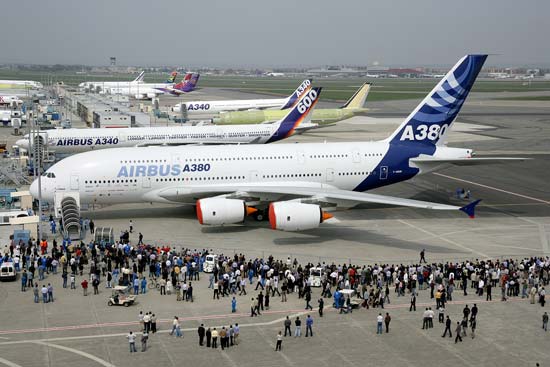
The first complete 787 Dreamliner hasn’t even rolled off the Boeing assembly line yet, and it has already become the most successful launch of a new aircraft in the history of aviation. According to this new Wall Street Journal article, Boeing has already accumulated 677 orders for the jet from 47 customers. And new orders are coming in almost daily.
The 787 was a HUGE “all-in” bet for Boeing in it’s competition with Europe’s heavily-subsidized Airbus for the world’s airliner business.
Several years ago, the two companies adopted two very different product strategies. In an era of rising fuel costs AND increasing long-haul travel, Airbus decided to build BIG. Their proposed answer for airlines wanting to increase efficiency was to build an aircraft that could carry a crazy number of people.
Thus, the Airbus A-380 was born a flying, triple-decker Titanic of a plane that can carry up to 800 people.

Runways at major airports all over the world are currently being lengthened in order to accommodate this beast. (Are you willing to climb on an airplane that’s carrying 800 other souls? I’ll pass.
Boeing took a different approach. It proposed to meet the airlines’ growing demand for efficiency by designing a jet that was lighter, more fuel efficient and more comfortable than any that had come before.
For several years now, industry analysts have been wondering which approach would find favor with the airline buyers. Well the jury is in. Boeing’s bet has paid off in a huge way. They literally can’t make them fast enough. Meanwhile, poor Airbus, massively unionized, regulated and drowning in complex agreements negotiated among the EU’s various member nations, just learned that, as the WSJ put it:
“. . . engineering teams in France and Germany had used different software to design the plane’s wiring, resulting in serious manufacturing errors.
Oopsies!
A Pattern Emerges
When I read today’s news about Boeing’s triumph, I was immediately reminded of a story I read several years ago about the different approaches the U.S. and Europe had taken back in the 1970s to combat the air pollution caused by automobiles.
The U.S. approach was to mandate catalytic converters in all new cars and begin to switch the nation over to the unleaded gasolines which the converters required. The Europeans had a better idea.
The problem, in their view, was all the people owning and driving cars when they could just as easily take a government-owned bus or train. So the governments of Europe began intentionally driving up the costs of owning and driving a personal vehicle in a big way. Heavy taxes and fees were added to every layer of of the system. Some of those tax revenues were used to increase the mass transit capabilities in the major cities and the network of train service in each country.
(This European approach, by the way, is consistently held up by “progressives” in this country as the model for how we ought to be doing it.)
Of course, one of the bedrock laws of economics is that if you want less of something, tax it. Thus, in terms of reducing the number of cars being purchased and driven, Europe’s plan worked. It crippled its own auto industry, threw millions out of work, and forced average working people to the buses and trains leaving the highways and autobahns to the elites.
But which of the two approaches actually cleaned up the air? Care to take guess?
By 1995, the air quality in U.S. cities was uniformly better than that in European cities of comparable size. The U.S. approach yielded such strikingly better results, that European nations have since begun to follow the U.S. approach without abandoning their punative taxes, of course. (Another reminder: there’s no such thing as a temporary tax.)
That brings us back to Boeing vs. Airbus. Apparently the European liberals have so much marxist/socialist DNA in their genetic material, they simply can’t help but think like centralizers and collectivists when approaching any problem.
No wonder they named their company Airbus.

